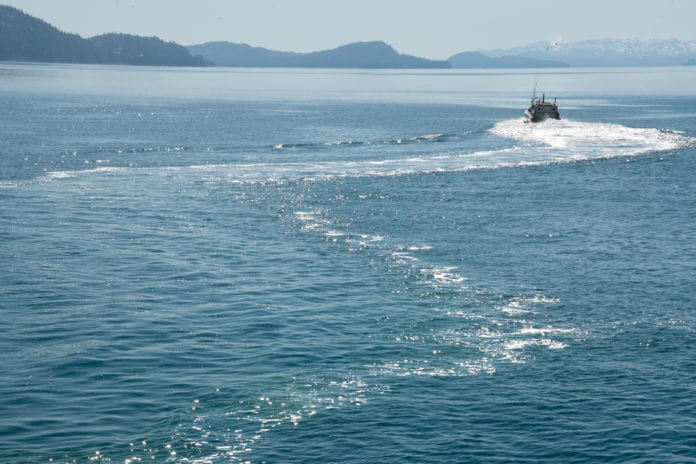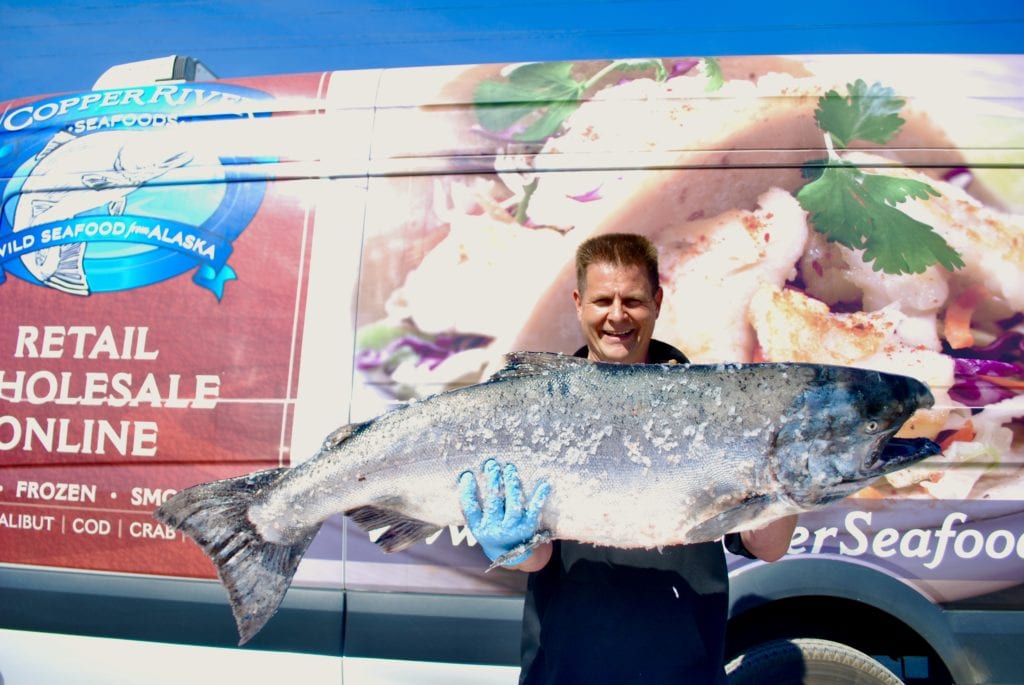
Fishing in the Copper River commercial salmon fishery got off to a slow start on Thursday, May 14 and kept up that pace for the second opener on Monday, May 18, under cool, rainy skies.
The catch for that first 12-hour opener stood at 1,650 Chinook and 1,500 sockeye salmon, down from 2,300 kings and 20,400 reds in the 2019 opener. The total second period catch was to be compiled by Tuesday, May 19, but some harvesters said the fish were still eluding their nets.
On the bright side, Cordova continued to hold its own against spread of the novel coronavirus pandemic, which has infected millions of people worldwide and killed thousands in the United States alone.
“I believe everyone is working very hard to ensure the community and fisheries are protected,” said Dr. Hannah Sanders, a family practice specialist and medical director at the Cordova Community Medical Center.
“We are ready to adapt to the challenges as they come,” Sanders said in an email response to questions. “Alaska has responded very aggressively to the threat of COVID-19. As a result, the state currently has capacity to assist smaller communities when and if the need arises. If this changes, Cordova will respond quickly to protect our community.”
State health officials on Monday, May 18, reported three new cases of infection in Alaska, two in Anchorage and one in Willow, bringing the statewide total to 399, of which 345 have recovered. A total of 43 of those individuals have been hospitalized at some point and the number of people who succumbed to COVID-19 remains at 10.
During a statewide COVID-19 teleconference update, Gov. Mike Dunleavy said that state health officials are in constant communication with Bristol Bay area officials regarding their concerns for mandatory pre-arrival quarantining and testing for fishermen who are arriving daily in advance of the Bristol Bay sockeye salmon fishery.
“Nothing is foolproof,” Dunleavy said. “We are going to do the best we can, but anything short of individuals living very isolated until there is a proven vaccine which could be a year or a year and a half, we have to learn to live with it and manage it.”
To date, both Cordova and Dillingham have had one non-resident seafood processing worker each diagnosed with COVID-19. In both cases these individuals had had temperature checks and interviews before coming to Alaska and both were doing their 14-day quarantine, in Cordova and Dillingham respectively, when they tested positive for the virus. Both were asymptomatic.
Trident officials said that all incoming seafood processing workers would now be doing their 14-day quarantine in Anchorage and be retested before heading for rural seafood processing locations, with the exception of Ketchikan and Petersburg, where they would be individually isolated for their quarantine in those communities.
Alaska Commissioner of Health and Social Services Adam Crum also noted that as of Tuesday, May 19, commercial fishermen heading to fishing grounds via Anchorage would be tested for COVID-19 there and should plan to stay in Anchorage an extra day or so to await test results.
Dunleavy also said that he believes that Alaska is ready to enter phase 3 of the state’s economy recovery program and that he would have further details on Tuesday, May 19.
“We are not rushing things,” he said.
Still he acknowledged the daunting economic impact of mandates imposed to keep the virus from spreading in Alaska and said, “we have to get society up and running.”
“The numbers don’t justify us doing anything but opening up,” he said. “We have weathered the surge but yes, we need to open up.”

Meanwhile, worries over a potential low price for the prized Copper River kings and red salmon combined with worries over the pandemic has lowered the competition for the fish, said Cordova Mayor Clay Koplin, who calculated that as much as one fourth of the fleet never left the harbor for the first opener.
Still, when the opener ended, there was enough to load onto an Alaska Air Cargo flight to Seattle to move on to grocery stores nationwide and to honor more than 200 health care workers at Swedish Medical Center in Seattle with a gourmet seafood dinner.
Alaska Airlines, Trident Seafoods, Ocean Beauty Seafoods, Copper River Seafoods, the Copper River Marketing Association and famed Seattle chef Tom Douglas collaborated to bring dinner to the health care workers on the frontline of medical care for pandemic patients.
On Sunday, May 17, there was a “Grilling for Good” fundraiser in which Douglas and Trident Seafoods teamed up to prepare grilled Copper River sockeye entrees available for purchase through the Tom Douglas website, tomdouglas.securetree.com/Events/Grilling-for-Good-Copper-River-Salmon-Meal with all proceeds to be donated to Food Lifeline.
Seattle’s famed Pike Place Fish Market was advertising Copper River king fillets for $74.99 a pound, whole Copper River kings for $659.99 apiece, Copper River sockeye fillets for $49.99 a pound and whole Copper River reds for $174.99.
Costco stores in Anchorage still had plenty of previously frozen fillets of sockeye salmon for sale at $9.99 a pound, plus fresh whole Copper River reds for $9.99 a pound.





